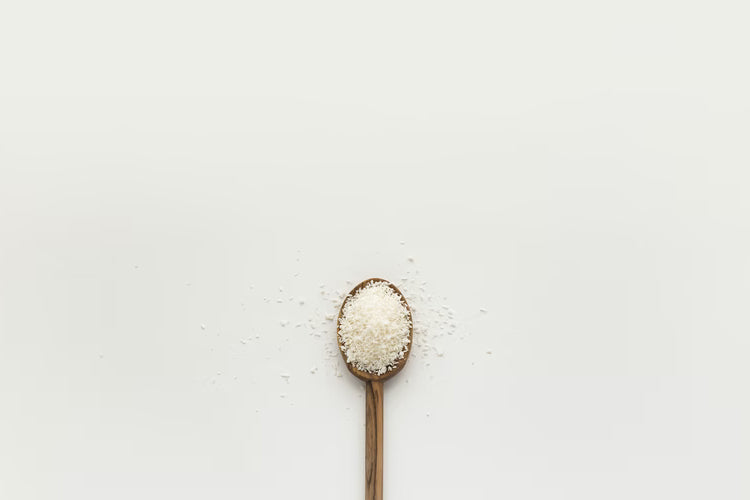It is recognized that practicing sports requires larger and more significant macro and micro nutritional intakes, in other words, vitamins and minerals.
The more intense the activity, the more our body needs more nutrients for its functioning.
Minerals are one of those nutrients that our body cannot do without, especially during physical activity.
In this article, we will take stock of the benefits of calcium in general but particularly its role and importance in athletes .
Calcium: what is it?
Calcium is the most abundant mineral in the human body.
And for good reason: it represents almost 1 to 2% of the body mass of an adult man [1]. Nearly 99% of calcium is stored in bones and teeth, the rest being located at the cellular level. Widely known for its benefits for bone health, calcium has many other properties.
What is the role of calcium?
Calcium, whose chemical symbol is Ca , is a mineral essential to our good health. And yet, it was only at the beginning of the 20th century that science succeeded in highlighting its importance
Calcium, in addition to its contribution to the formation and strength of bone and tooth mass, plays a role in a multitude of metabolic and chemical reactions:
- Coagulation;
- The release of hormones;
- Muscle contraction;
- And nerve conduction;
- Intracellular function (stability of plasma membranes) [2].
It should be noted that non-bone calcium, which represents, remember, 1% of total calcium, is present in all the cells of the body (including muscle, nerve and heart cells).
Finally, according to a study conducted in 1999, a sufficient intake of Calcium could have a preventive effect against high blood pressure [3].
The benefits of calcium for athletes
Calcium is particularly important for athletes.
As mentioned previously, it plays an essential role in maintaining bone structure and muscle contraction . But calcium is also involved in another mechanism essential to athletes: that of energy production .
It also participates in the breakdown of glycogen into glucose, thus providing energy to the body.
Finally, if calcium is useful for athletes, conversely, sports practice has positive effects on calcium fixation.
This was highlighted in a 2007 study from Mahidol University in Thailand.
Researchers have demonstrated that a sedentary lifestyle, like a low calcium intake, slows down the development of bones and accelerates their decline. Indeed, practicing sport promotes calcium fixation, which strengthens the bone system and reduces the risk of fractures [5].
What are the calcium requirements?
According to the National Agency for Food, Environmental and Occupational Health Safety (ANSES), the recommended nutritional value (NRV) for the population is [7]:
- 1000 mg/day in 19-23 year olds;
- 950 mg/day for those over 24;
Among athletes, requirements are higher because regular sport practice increases daily calcium requirements [4].
The latter are between 1200 and 1500 mg/day [8]. They are more important in female athletes.
Food sources of calcium
Calcium must be provided through food because the body does not synthesize calcium.
An external supply is therefore essential to correct a possible calcium deficiency. However, before thinking about calcium supplementation in the form of tablets or sachets, it is important to emphasize that the diet, especially for an athlete, must be varied, simple and balanced.
Calcium is found in:
- Dairy products (milk, yogurt, cheese, etc.);
- Vegetables and starchy foods (white beans, chickpeas, cabbage, cauliflower);
- Oilseeds (almonds etc.);
- Mineral waters (with very variable contents, indicated on the label)
Calcium deficiency
Calcium deficiency may go unnoticed in the short term because no signs may appear.
In the long term, the signs of a calcium deficiency can manifest as a weakening of the bone system: growth retardation in children or osteomalacia in adults.
In athletes, a deficiency, or more simply an insufficient intake of calcium, has a direct impact on physical performance.
Insufficient intake or deficiency of calcium degrades the quality of muscle contraction and bone density.
Recovery time is also impaired. Fatigue during exercise, coordination and speed problems can also be added to the clinical picture of calcium deficiency.
Calcium in our Argalys Essentiels food supplements
Two of our Argalys Essentiels formulas contain Calcium: VegaKid and the Calcium + Vitamin D3 and Boron supplement.
The Calcium + Vitamin D + Boron formula is particularly suitable for athletes.
Each capsule contains calcium in the form of Calcium Carbonate, a form much better absorbed than carbon citrate. It is associated with vitamin D because it is essential for the fixation and assimilation of calcium and boron, which allows better bone mineralization.
References :
[1]: Institute of Medicine (US) Standing Committee on the Scientific Evaluation of Dietary Reference Intakes. Dietary Reference Intakes for Calcium, Phosphorus, Magnesium, Vitamin D, and Fluoride. Washington (DC): National Academies Press (US); 1997. 4, Calcium. Available from: https://www.ncbi.nlm.nih.gov/books/NBK109827/
[2]: K. Shawn Davison, David A. Hanley, Chapter 4 - Fundamentals of Mineral Homeostasis, Editor(s): Eric S. Orwoll, John P. Bilezikian, Dirk Vanderschueren, Osteoporosis in Men (Second Edition), Academic Press , 2010, Pages 41-50, ISBN 9780123746023, https://doi.org/10.1016/B978-0-12-374602-3.00004-3 . https://www.sciencedirect.com/science/article/pii/B9780123746023000043
[3]: McCarron DA, Reusser ME. Finding consensus in the dietary calcium-blood pressure debate. J Am Coll Nutr. 1999 Oct;18(5 Suppl):398S-405S. doi:10.1080/07315724.1999.10718904. PMID: 10511320. https://pubmed.ncbi.nlm.nih.gov/10511320/
[4]: Williams MH. Dietary supplements and sports performance: minerals. J Int Soc Sports Nutr. 2005;2(1):43-49. Published 2005 Jun 11. doi:10.1186/1550-2783-2-1-43 https://www.ncbi.nlm.nih.gov/pmc/articles/PMC2129162/
[5]: CHAROENPHANDHU, Narattaphol. (2007). Physical activity and exercise affect intestinal calcium absorption: a perspective review. J Sports Sci Technol. 7. http://www.narattsys.com/press/JSST2007.pdf
[6]: .J. Roach, Glycogen Metabolism, Editor(s): William J. Lennarz, M. Daniel Lane, Encyclopedia of Biological Chemistry (Second Edition), Academic Press, 2013, Pages 425-427, ISBN 9780123786319, https://doi.org/ 10.1016/B978-0-12-378630-2.00042-6 . ( https://www.sciencedirect.com/science/article/pii/B9780123786302000426 )
[7]: https://www.anses.fr/fr/content/le-calcium
[8]: Campbell WW, Geik RA. Nutritional considerations for the older athlete. Nutrition. 2004 Jul-Aug;20(7-8):603-8. doi: 10.1016/j.nut.2004.04.004. PMID: 15212741. https://pubmed.ncbi.nlm.nih.gov/15212741/
Our food supplement rich in Calcium:

Discover Calcium
 04 74 03 98 80
04 74 03 98 80









